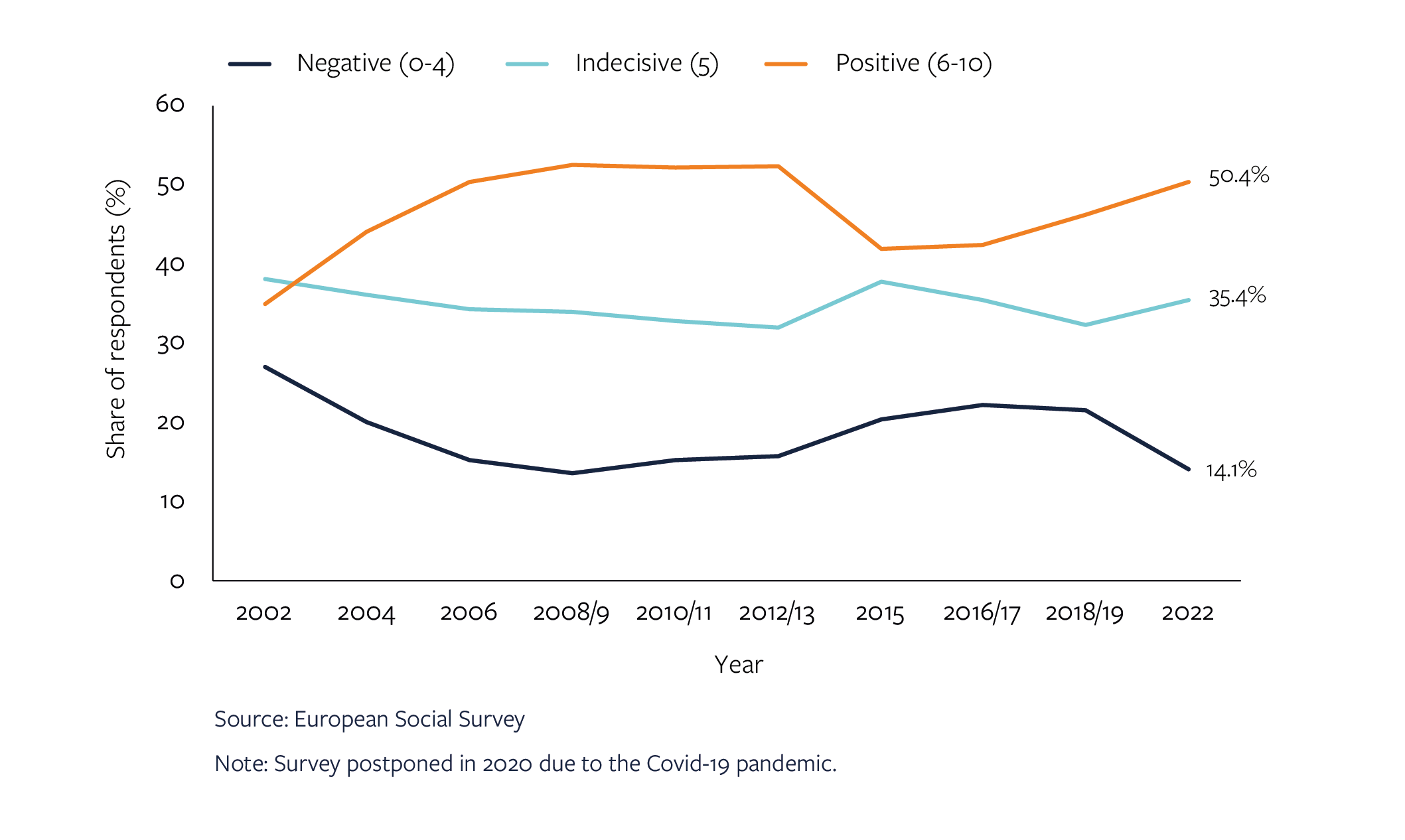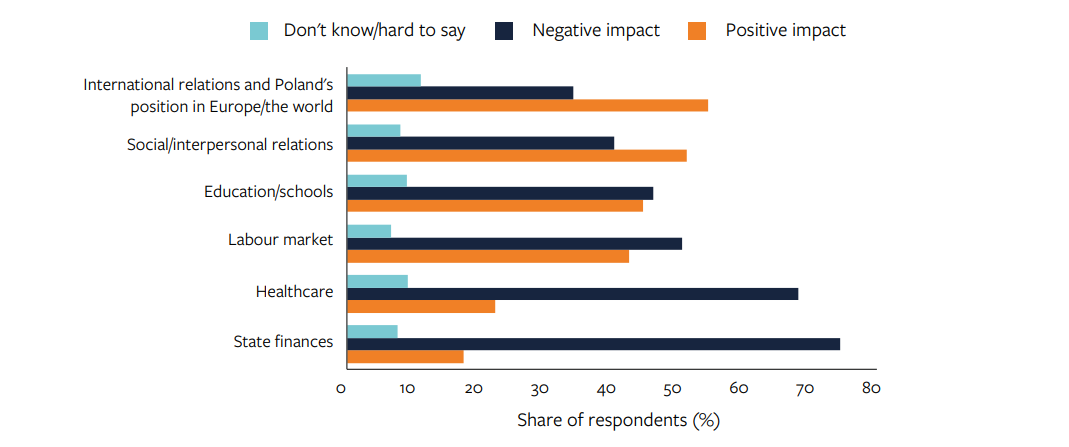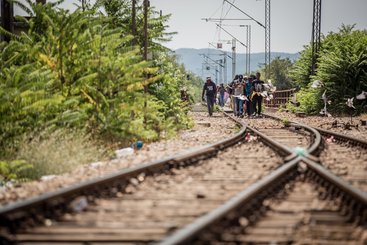On 24 February 2022, just hours after the first Russian bombs fell in Ukraine, a committee – comprised of NGOs and city officials – met in Lublin, a major city in eastern Poland.
As the committee gathered, they discussed the outbreak of conflict, the expected arrival of refugees, and, crucially, how institutions within the city could respond to organise assistance. In the days and weeks that followed, cooperation between NGOs and city officials deepened. The ad hoc committee (which later became known as the Lublin Social Committee to Aid Ukraine) was at the centre of a wide-ranging response that brought together city staff, NGOs and volunteers of all ages and backgrounds to provide assistance and shelter to Ukrainians.
Lublin is just one example of numerous cities across Poland – and indeed across Europe more widely – that showed leadership in response to recent Ukrainian refugee arrivals. In Poland, cities have formed part of a bottom-up response, driven by well-established local NGOs, local authorities and ordinary citizens.
Since the outbreak of the conflict over 1.5 million refugees from Ukraine have been registered for protection in Poland (though not all remain in the country), the majority of whom have settled in cities. In the early months of the recent conflict the city of Rzeszów, close to Poland’s border with Ukraine, took in over 100,000 refugees, increasing the city’s population by more than half.
In Warsaw, city authorities have played a crucial role managing large numbers of volunteers assisting Ukrainians, with over 6,000 registered in the first two weeks of the conflict. The City of Warsaw has spearheaded initiatives from a project vetting housing offered to Ukrainians by city residents, to an employment service launched specifically to assist Ukrainians.
In the early days of the crisis, authorities in Kraków were quick to offer a number of services to those fleeing the conflict, including information points, psychological and legal assistance, free public transport and a database with job offers for refugees.
Cities across Poland have long played an important role assisting and supporting the integration of refugees and other migrants, often in the absence of central government frameworks and institutions. In 2016, Gdańsk became the first city in Poland to develop an ‘Immigration Integration Model’, with Krakow and Wroclaw following suit. Warsaw's mainstreaming of migration into an inclusive vision for all citizens of the city is also notable.
How Polish cities have put forward an alternative narrative on refugees and other migrants
Most critically, our recent research highlights how Poland’s cities have long shown leadership not just in their practical response to refugees and other migrants, but in the narratives they put forward in the public domain.
In 2015, for the first time in Poland’s history, immigration – and policies around refugees in particular – became the subject of national debate. In the midst of Europe’s ‘refugee crisis’, the Law and Justice Party (PiS) leveraged opposition to the EU’s relocation scheme for refugees as a centrepiece of its successful parliamentary election campaign. The campaign, echoed by supportive media outlets, painted refugees from the Middle East and Africa – and Muslim refugees in particular – as a threatening ‘other’, seeking to destroy Poland’s culture, security and values.
This found significant traction with Polish public opinion. Data from CBOS – a notable Polish public opinion polling institute (though some have raised questions about their surveys on migration issues) – tracks the rise in opposition to accepting refugees from conflict-affected countries. From May 2015 to April 2016 this proportion almost tripled from 21% to 61%. In 2016 Pew Research Centre found that almost three-quarters of Poles agreed that refugees leaving countries such as Iraq and Syria were a major threat to Poland.
The ‘us’ and ‘them’ narrative invoked around refugees from the Middle East and Africa remains a dominant element of public debate. Recently, it has been revived by the PiS government and right-wing media in the context of the humanitarian crisis on Poland’s border with Belarus, with the situation described as a ‘hybrid war’ and groups assisting arrivals on the border denounced as ‘fools and traitors’.
Yet, in the face of these dynamics, since 2015 mayors in Poland’s cities and towns – particularly those from opposition parties – have been part of efforts to put forward alternative narratives rooted in empathy, solidarity, compassion and tolerance. In 2017 12 city mayors from the Civic Platform Party published a joint letter committing to working together to support migrant integration. They stressed the values of openness, diversity, solidarity, as well as the potential economic advantages of doing so.
In November 2021 the Mayor of Michałów, a town that became a centre for protests against the government’s approach on the Poland-Belarus border, published an open letter to Poland’s Prime Minister and the Council of Europe. The letter highlighted the situation as a humanitarian tragedy and articulated his belief that the refugees were not a threat to Polish society. Public opinion data suggests that, at least in some key respects, many Poles today agree – and others still may be open to persuasion.
Since 2015, public attitudes in Poland towards refugees – and immigration more broadly – have become more positive. In 2022 the European Social Survey found that half of Poles felt that immigration made Poland a better place to live.
Attitudes towards immigration: does immigration make Poland a worse or a better place to live?

In spite of the Polish government’s hard line response to those seeking refuge at the Poland-Belarus border, in 2021 only around a third of Poles supported closing Poland’s borders entirely to refugees. Meanwhile, few supported the more restrictive elements of the government’s approach. For example almost three quarters of those surveyed by CBOS supported allowing access to the Poland-Belarus border for humanitarian organisations.
Anticipating challenges ahead
In the case of Ukrainians fleeing the recent conflict, narratives from city leaders have converged more clearly with those from Poland’s central government, expressing solidarity and making clear that refugees from the conflict would be welcomed in Poland.
However, where city leaders have diverged is in their openness to discussing challenges, local leaders have repeatedly highlighted the need for more systemic solutions to the crisis across Europe and within Poland, calling for greater funding to be channelled directly to local authorities.
To date (and for a variety of reasons) attitudes towards Ukrainian refugees have been – and remain – remarkably positive. Yet there is little room for complacency, particularly as the crisis grows protracted. Our research highlighted that many Poles see long-term challenges linked to accommodating Ukrainians, with potential for concerns to grow in the context of rising living costs.
To their credit, city administrations across Poland have been quick to see the importance of understanding potential concerns. In April/May 2022 the Union of Polish Metropolises – a partnership of 12 major Polish cities – undertook a survey which, amongst other aspects, sought to understand the perspectives of city residents on the impacts of hosting Ukrainian refugees. While respondents were positive when it came to interpersonal relations, the survey pointed to very real concerns about the impact on state finances and healthcare.
Opinion in Poland’s major cities on the long-term impacts of hosting Ukrainian refugees

Looking to the future: cities at the centre
For now, Poland is at a crossroads, both in terms of its response to Ukrainian refugees and to other groups of refugees and migrants in the country. It remains to be seen how public opinion towards Ukrainian refugees will evolve. Questions also remain about how positive narratives and public attitudes around Ukrainian refugees will go on to impact those concerning other groups.
What is certain though, is that in both respects, Poland’s cities will continue to play a key role. There is an opportunity to build on Poles’ extraordinary willingness to help Ukrainian refugees to emphasise the vision of a tolerant, compassionate, welcoming Poland. Notably, this is how many of Poland’s city leaders have been framing debates – and action – around migration and refugees for years. Perhaps now is the time to listen to them.
Many thanks go to all those who supported and participated in the research – and especially to co-authors Kseniya Homel and Lenka Dražanová.


